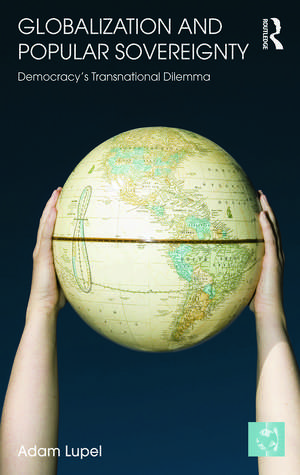Globalization and Popular Sovereignty: Democracy’s Transnational Dilemma: Rethinking Globalizations
Autor Adam Lupelen Limba Engleză Paperback – 26 sep 2011
This volume analyzes the impact of globalization on the concept of popular sovereignty and rethinks it for the transnational domain. It explores how popular sovereignty has historically determined the form of democratic citizenship and how democratic citizenship and legitimacy can be conceived in the transnational sphere in the absence of a global sovereign order. By inquiring into the new global context of popular sovereignty, the book seeks to better understand the emerging structures of global governance and their potential for democratic legitimacy. Lupel argues:
- That the challenges of globalization necessitate a rethinking of the concept of popular sovereignty beyond the domain of the nation-state
- That such a rethinking reveals a tension between the particularism of democratic legitimacy and the universalism of cosmopolitan politics
- Thus critical attention to the constitutive processes of global governance must become an integral part of democratic theory in the context of globalization; and a principle of transnational popular sovereignty provides the best resources for this purpose.
| Toate formatele și edițiile | Preț | Express |
|---|---|---|
| Paperback (1) | 409.13 lei 6-8 săpt. | |
| Taylor & Francis – 26 sep 2011 | 409.13 lei 6-8 săpt. | |
| Hardback (1) | 1054.71 lei 6-8 săpt. | |
| Taylor & Francis – 5 aug 2009 | 1054.71 lei 6-8 săpt. |
Din seria Rethinking Globalizations
-
 Preț: 326.74 lei
Preț: 326.74 lei -
 Preț: 311.06 lei
Preț: 311.06 lei -
 Preț: 288.15 lei
Preț: 288.15 lei -
 Preț: 311.41 lei
Preț: 311.41 lei - 9%
 Preț: 940.58 lei
Preț: 940.58 lei - 9%
 Preț: 970.28 lei
Preț: 970.28 lei - 18%
 Preț: 1002.95 lei
Preț: 1002.95 lei - 21%
 Preț: 270.20 lei
Preț: 270.20 lei -
 Preț: 487.37 lei
Preț: 487.37 lei - 18%
 Preț: 1055.69 lei
Preț: 1055.69 lei -
 Preț: 411.42 lei
Preț: 411.42 lei - 18%
 Preț: 1064.01 lei
Preț: 1064.01 lei -
 Preț: 490.83 lei
Preț: 490.83 lei -
 Preț: 423.33 lei
Preț: 423.33 lei -
 Preț: 380.74 lei
Preț: 380.74 lei -
 Preț: 486.17 lei
Preț: 486.17 lei - 18%
 Preț: 1058.86 lei
Preț: 1058.86 lei - 23%
 Preț: 301.97 lei
Preț: 301.97 lei - 18%
 Preț: 1055.38 lei
Preț: 1055.38 lei - 15%
 Preț: 698.43 lei
Preț: 698.43 lei - 18%
 Preț: 1057.05 lei
Preț: 1057.05 lei - 26%
 Preț: 821.10 lei
Preț: 821.10 lei - 15%
 Preț: 698.03 lei
Preț: 698.03 lei - 18%
 Preț: 1061.93 lei
Preț: 1061.93 lei - 18%
 Preț: 997.93 lei
Preț: 997.93 lei - 18%
 Preț: 1278.08 lei
Preț: 1278.08 lei - 16%
 Preț: 188.28 lei
Preț: 188.28 lei - 15%
 Preț: 434.24 lei
Preț: 434.24 lei -
 Preț: 430.43 lei
Preț: 430.43 lei - 18%
 Preț: 1112.90 lei
Preț: 1112.90 lei -
 Preț: 391.29 lei
Preț: 391.29 lei - 18%
 Preț: 1056.14 lei
Preț: 1056.14 lei - 18%
 Preț: 1061.36 lei
Preț: 1061.36 lei - 26%
 Preț: 848.15 lei
Preț: 848.15 lei - 31%
 Preț: 763.97 lei
Preț: 763.97 lei - 18%
 Preț: 1062.98 lei
Preț: 1062.98 lei -
 Preț: 272.92 lei
Preț: 272.92 lei - 18%
 Preț: 1054.75 lei
Preț: 1054.75 lei -
 Preț: 275.09 lei
Preț: 275.09 lei - 18%
 Preț: 1002.60 lei
Preț: 1002.60 lei
Preț: 409.13 lei
Nou
Puncte Express: 614
Preț estimativ în valută:
78.31€ • 85.09$ • 65.82£
78.31€ • 85.09$ • 65.82£
Carte tipărită la comandă
Livrare economică 21 aprilie-05 mai
Preluare comenzi: 021 569.72.76
Specificații
ISBN-13: 9780415670425
ISBN-10: 041567042X
Pagini: 200
Dimensiuni: 156 x 234 x 11 mm
Greutate: 0.29 kg
Ediția:1
Editura: Taylor & Francis
Colecția Routledge
Seria Rethinking Globalizations
Locul publicării:Oxford, United Kingdom
ISBN-10: 041567042X
Pagini: 200
Dimensiuni: 156 x 234 x 11 mm
Greutate: 0.29 kg
Ediția:1
Editura: Taylor & Francis
Colecția Routledge
Seria Rethinking Globalizations
Locul publicării:Oxford, United Kingdom
Public țintă
Postgraduate and UndergraduateCuprins
Preface 1. Introduction: Popular Sovereignty and Globalization 2. Trajectories of Popular Sovereignty 3. The Liberal Model of Popular Sovereignty: John Locke 4. The Republican Model of Popular Sovereignty: Jean-Jacques Rousseau 5. The Deliberative Model of Popular Sovereignty: Jürgen Habermas 6. Responses to Globalization (I) Habermas’s Postnational Constellation 7. Responses to Globalization (II) David Held’s Cosmopolitan Democracy and Global Civil Society 8. Conclusion: Toward a Transnational Politics of Popular Sovereignty
Recenzii
An excellent discourse on the concept of sovereignty and on how this is transformed in the global age. It provides an imaginative and erudite comparison between the classic and the modern concepts of sovereignty. Lupel uncovers how democracy is today challenged and offers important insights to make democracy compatible with globalization by granting greater legitimacy and powers to transnational movements and institutions. Daniele Archibugi, Italian National Research Council, Italy, and Birkbeck College, University of London, UK
Does globalization render the concept of popular sovereignty dépassé? Seeking to redeem an indispensable element of democracy, Adam Lupel undertakes to re-imagine popular sovereignty for a postwestphalian world. After sorting the wheat from the chaff in leading proposals by Jürgen Habermas and David Held, Lupel develops an alternative conception whereby "the people" may exercise constituent authority in a decentered system of global governance. The result is an important exploration of the possible meanings of popular sovereignty in globalization. Nancy Fraser, Henry A. and Louise Loeb Professor of Political and Social Science, The New School for Social Research, New York, USA
'Globalization and Popular Sovereignty is an insightful and sustained study of 'popular sovereignty' and the challenges posed to it by globalization.' - Craig Borowiak, Perspectives on Politics, Vol. 9, September 2011
'An excellent discourse on the concept of sovereignty and on how this is transformed in the global age. It provides an imaginative and erudite comparison between the classic and the modern concepts of sovereignty. Lupel uncovers how democracy is today challenged and offers important insights to make democracy compatible with globalization by granting greater legitimacy and powers to transnational movements and institutions.' - Daniele Archibugi, Italian National Research Council, Italy, and Birkbeck College, University of London, UK
'Does globalization render the concept of popular sovereignty dépassé? Seeking to redeem an indispensable element of democracy, Adam Lupel undertakes to re-imagine popular sovereignty for a postwestphalian world. After sorting the wheat from the chaff in leading proposals by Jürgen Habermas and David Held, Lupel develops an alternative conception whereby "the people" may exercise constituent authority in a decentered system of global governance. The result is an important exploration of the possible meanings of popular sovereignty in globalization.' - Nancy Fraser, Henry A. and Louise Loeb Professor of Political and Social Science, The New School for Social Research, New York, USA
Does globalization render the concept of popular sovereignty dépassé? Seeking to redeem an indispensable element of democracy, Adam Lupel undertakes to re-imagine popular sovereignty for a postwestphalian world. After sorting the wheat from the chaff in leading proposals by Jürgen Habermas and David Held, Lupel develops an alternative conception whereby "the people" may exercise constituent authority in a decentered system of global governance. The result is an important exploration of the possible meanings of popular sovereignty in globalization. Nancy Fraser, Henry A. and Louise Loeb Professor of Political and Social Science, The New School for Social Research, New York, USA
'Globalization and Popular Sovereignty is an insightful and sustained study of 'popular sovereignty' and the challenges posed to it by globalization.' - Craig Borowiak, Perspectives on Politics, Vol. 9, September 2011
'An excellent discourse on the concept of sovereignty and on how this is transformed in the global age. It provides an imaginative and erudite comparison between the classic and the modern concepts of sovereignty. Lupel uncovers how democracy is today challenged and offers important insights to make democracy compatible with globalization by granting greater legitimacy and powers to transnational movements and institutions.' - Daniele Archibugi, Italian National Research Council, Italy, and Birkbeck College, University of London, UK
'Does globalization render the concept of popular sovereignty dépassé? Seeking to redeem an indispensable element of democracy, Adam Lupel undertakes to re-imagine popular sovereignty for a postwestphalian world. After sorting the wheat from the chaff in leading proposals by Jürgen Habermas and David Held, Lupel develops an alternative conception whereby "the people" may exercise constituent authority in a decentered system of global governance. The result is an important exploration of the possible meanings of popular sovereignty in globalization.' - Nancy Fraser, Henry A. and Louise Loeb Professor of Political and Social Science, The New School for Social Research, New York, USA
Descriere
This volume analyzes the impact of globalization on the concept of popular sovereignty, seeking to better understand the emerging structures of global governance and their potential for democratic legitimacy.
















